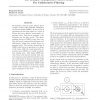Free Online Productivity Tools
i2Speak
i2Symbol
i2OCR
iTex2Img
iWeb2Print
iWeb2Shot
i2Type
iPdf2Split
iPdf2Merge
i2Bopomofo
i2Arabic
i2Style
i2Image
i2PDF
iLatex2Rtf
Sci2ools
123
click to vote
ICML
2004
IEEE
2004
IEEE
The multiple multiplicative factor model for collaborative filtering
We describe a class of causal, discrete latent variable models called Multiple Multiplicative Factor models (MMFs). A data vector is represented in the latent space as a vector of factors that have discrete, non-negative expression levels. Each factor proposes a distribution over the data vector. The distinguishing feature of MMFs is that they combine the factors' proposed distributions multiplicatively, taking into account factor expression levels. The product formulation of MMFs allow factors to specialize to a subset of the items, while the causal generative semantics mean MMFs can readily accommodate missing data. This makes MMFs distinct from both directed models with mixture semantics and undirected product models. In this paper we present empirical results from the collaborative filtering domain showing that a binary/multinomial MMF model matches the performance of the best existing models while learning an interesting latent space description of the users.
ICML 2004 | Latent Variable Models | Machine Learning | Multiplicative Factor Models | Undirected Product Models |
Related Content
| Added | 17 Nov 2009 |
| Updated | 17 Nov 2009 |
| Type | Conference |
| Year | 2004 |
| Where | ICML |
| Authors | Benjamin M. Marlin, Richard S. Zemel |
Comments (0)

